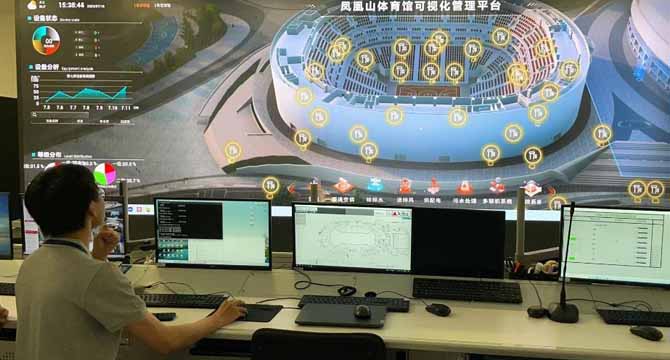CHENGDU, July 21 (Xinhua) — How to achieve efficient and cost-effective operation of a sports venue during a major event? The upcoming Chengdu Universiade sets a shining example with a cutting-edge solution — digital transformation.
Scheduled to take place from July 28 to August 8 in Chengdu, southwest China’s Sichuan Province, the 31st International University Sports Federation (FISU) Summer World University Games will feature 18 sports over 12 days.
The Phoenix Hill Sports Park, home to a key venue for the Universiade, has embraced a powerful digital “brain” that revolutionizes its operational efficiency.
With a streamlined interface, this digital platform presents a simulated spatial model, providing a comprehensive overview of the venue’s structure, facilities, and equipment and their operational status.
A wide range of information is just a click away with this platform. Such information includes temperature and humidity both indoors and outdoors, water pressure and flow rate, energy consumption of lighting equipment, and the flow of people at the entrance and exit, among others.
Wei Tianyou, who has worked as a venue operator for over 20 years, is deeply impressed by the system. “In the past, we had to manually inspect equipment one by one, holding paper forms,” he recalled.
However, with the implementation of this intelligent system, efficiency has soared. A recent competition at the venue saw a water pump malfunction, leading to a bathroom water outage. The smart system promptly detected and reported the issue, enabling maintenance workers to switch to a backup pump within a mere three minutes.
Previously, such tasks could have taken up to half an hour, said Wei, who’s in charge of the operation and maintenance of basketball courts in the sports park.
Based on actual operational data, the system has helped reduce the overall energy consumption by approximately 15 percent, increase equipment operational efficiency by around 20 percent, and reduce maintenance costs by approximately 30 percent.
“It has bolstered our confidence in successfully operating the stadium during the Chengdu Universiade,” Wei added.
At the Jianyang Culture and Sports Center, which will host diving, judo, and other Universiade events, a fire emergency drill showcased the value of a “fire control brain,” which pointed out a clear evacuation route formed by flashing indicator lights.
This is the optimal evacuation route automatically generated by the intelligent system that “commands” 2,690 sets of emergency lights based on different alarm points, making sure that the crowd can be guided to safety as quickly as possible.
Also in the center, an “energy brain” automatically monitors data from 76 water meters and 196 electricity meters, and a “lighting brain” can perform time-sharing and zoning intelligent control on 516 sets of special event lights and 6,010 ordinary lights.
Thanks to these digital “brains,” only six people are needed to ensure the normal operation of a venue encompassing an extensive 150,000 square meters.
To ensure the effective and efficient hosting of the Universiade, Chengdu has carried out intelligent transformation of 22 venues with excellent infrastructure. These upgrades not only meet the needs of the Universiade but also support the venues’ continuous operation after the Games.

